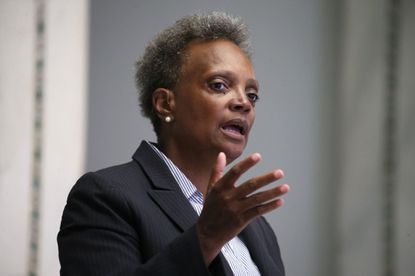
Citing the “catastrophic collapse of our local and national economy” due to COVID-19 and damage to local businesses from civil unrest, Mayor Lori Lightfoot on Monday laid out a $1.2 billion budget shortfall for 2021 — what she called Chicago’s “pandemic budget.”
Filling the historic deficit will likely require personnel cuts and could lead to layoffs, while the mayor promised to use a TIF surplus and consider a possible computer lease tax as other potential measures. Lightfoot made no mention of a possible property tax hike in her prepared remarks.
Asked afterward for specifics about cuts or taxes, Lightfoot said that “all options are on the table,” though property taxes and job cuts are at the back of her list.
“The reality is that life will be different for the foreseeable future, impacting how services are provided and how departments are structured, and we must adjust to meet that reality,” Lightfoot said during an afternoon speech at the Cultural Center. “A very difficult part of reimagining government will also include looking to our workforce, and making needed changes in places that are not being fully utilized during the remainder of this crisis and in our post-COVID-19 world.”
In her speech, Lightfoot largely avoided discussion about the city’s rising pension costs aside from calling for state lawmakers to work together and solve the problem. But alluding to the issue, Lightfoot pushed back against Republican critics who say the federal government shouldn’t help blue cities and states like Chicago and Illinois because their budget woes are “a result of years of mismanagement.”
“In other words, our own darn fault,” Lightfoot said. “Simply not true. COVID-19 1/4 u2032s estimated impact on revenue loss for 2021 totals no less than $783 million, or 65% of our total estimated gap. So, the vast majority of our gap for next year is because of revenue loss due to COVID-19.”
The ongoing coronavirus crisis has also spiked the 2020 budget shortfall to nearly $800 million, though Lightfoot said that deficit would be filled using relief funds and other unspecified aid from the federal government, debt refinancing, and borrowing.
Chicago’s total budget last year was about $11.65 billion.
In laying out the 2021 shortfall, Lightfoot cited dire numbers — more than 900,000 Chicago-area residents filed for unemployment since the start of the pandemic, while personal services, hospitality and tourism industries “are still seeing a fraction of their typical revenues and some businesses have sadly closed with no hope of coming back.”
She also pledged to rely on old tactics to fill the deficit, like closing unfilled job vacancies
In laying out the 2021 shortfall, Lightfoot cited dire numbers — more than 900,000 Chicago-area residents have filed for unemployment since the start of the pandemic, while personal services, hospitality and tourism industries “are still seeing a fraction of their typical revenues and some businesses have sadly closed with no hope of coming back.”
She also pledged to rely on old tactics to fill the deficit, like closing unfilled job vacancies.
Following the forecast, Lightfoot’s administration will host virtual town halls each night this week to get residents’ ideas on how to deal with the situation.
The bad news has seemed inevitable for months, as tax receipts plummeted with large parts of the economy shut down and spending in Chicago by tourists and conventioneers cratered throughout the summer because of the coronavirus pandemic.
Lightfoot announced in June that the crisis had already blown a $700 million hole in this year’s spending plan.
The mayor says she has tried to make Chicago the “most open big city in America” by allowing limited indoor dining, letting gyms reopen and taking other steps to boost the city’s bottom line in recent months. But spending on those kinds of amenities remains just a fraction of what it was prior to COVID-19.
And even before the pandemic hit and decimated many of the city’s most important revenue streams, Lightfoot figured to be faced with an ugly 2021 financial outlook.
After announcing in a televised prime time August 2019 speech that Mayor Rahm Emanuel had saddled her with an $838 million deficit for 2020, Lightfoot said that she dealt with it by making structural changes like cutting government costs through so-called zero-based budgeting and eliminating vacant positions.
Sign up for The Spin to get the top stories in politics delivered to your inbox weekday afternoons.
Critics wondered whether such departmental savings would really amount to $150 million, as the Lightfoot administration claimed.
The mayor also turned to several big ticket one-time fixes to close the gap rather than calling for large-scale revenue increases like property tax hikes that would have hit broad swaths of Chicagoans and been politically difficult for the new mayor.
The mayor got the City Council to pass a budget that relied on $215 million from debt refinancing, and another $163 million from federal Medicare officials to reimburse the city for the cost of Chicago Fire Department ambulance trips, money that’s been slow to arrive from Washington.
And she closed five tax increment financing districts to send about $300 million back to public coffers, though just $31.4 million of that went to the city’s budget.
Many aldermen were happy there was no big property tax jump for 2020, and passed her package 39-11. But some of them wondered privately why she didn’t leverage her popularity coming off her election win to ram through the hike then rather than waiting until later in her term.
It will be much harder to point to her predecessor if she turns to the dreaded property taxes this time, though she would certainly point to the unprecedented nature of the virus to justify the move.
*story by The Chicago Tribune